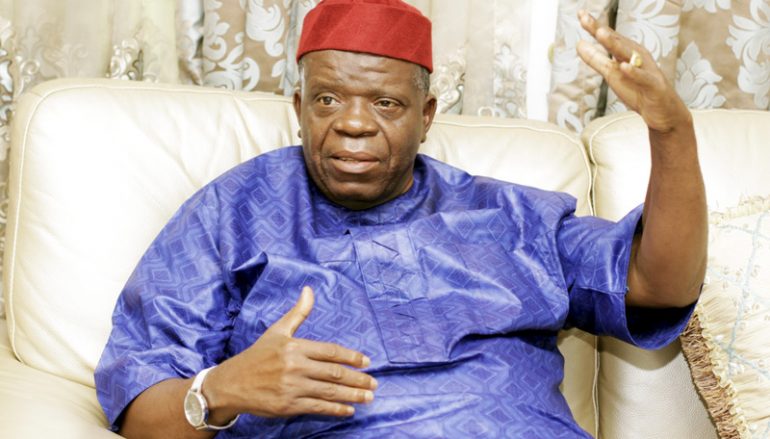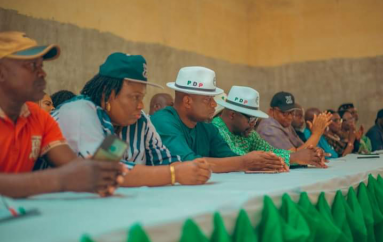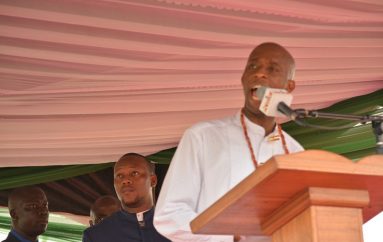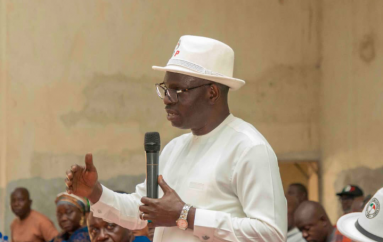
PDP Placed Loyalty Above Individual Differences – Obong Eno Akpan
As one who played active roles to midwife the Peoples Democratic Party (PDP) in Ukanafun Local Government Area, Obong Eno Akpan, a former council chairman, who in 1999 was elected to the House of Representatives and later served as commissioner in various ministries, including Lands and Town planning, Agriculture and Natural Resources, is in the know of all the politicking, effective bargaining and lobbying that put the party above all others in its formative stages in Ukanafun. He also disclosed the factors responsible for the defeat of PDP in the December 5, 1998, local government elections by then All Peoples Party (APP) in Ukanafun.
In this interview with The Scroll team, he revealed the essence of collective agreement, party supremacy and loyalty in strengthening the PDP, for it to resume the leadership roles for which it was formed. Excerpts…
How was the PDP formed in Ukanafun Local Government Area in 1998?
The party was convened officially in November, 1998 and few people signed that convening meeting. I nominated the late Dick Inana, in my area to sign on our behalf. I I refused to sign because, I thought I was too young for that, but if it was today that the youths push for things a lot, I would have signed.
Were you aspiring for any position then?
No, I was not aspiring at that time. At that time, the party was at the formative stages. It had just been introduced to the people of the state and this was in September, 1998.
Who chaired that meeting?
It was Atuekong Don Etiebet.
You have mentioned the late Dick Inana as one of the persons who did the pioneering work to start the party in the local government. For the purpose of history, can you name other persons who were with you to start the party in Ukanafun Local Government Area?
I was the first person that had contact with the PDP in my local government area. Others were my followers and I will not dare mention their names. Even those that are shining in the party today were not there at that time.
Considering the fact that you were there in 1998, can you relate to us the controversies concerning the party structure and leadership of the party?
At the beginning, there was no crisis in PDP, because what we had was a transitional administration under the chairmanship of Joe Ating of blessed memory and a very powerful secretary in the person of Elder Ntienyong Inyangmme. These were great men and sound political administrators. What could have been a seeming struggle, which is normal in politics, was on who emerges as the governorship candidate; a governorship race that had Chief Nsima Umoh, Chief Benji Okoko, Obong Victor Attah, Chief Itakk Ekarika, Dr. Ekeng Anam Ndu and the other aspirants. But in the wisdom of the party’s leadership, most especially, Atuekong Don Etiebet, an agreement was reached, which made the process less rancorous.
A consensus was reached to allow Obong Attah fly the party’s gubernatorial flag in the collective interest of Akwa Ibom State. And that was it. Everybody worked together for Obong Attah to become the second civilian governor of Akwa Ibom State in 1999. This process went very well; nobody thought other things would emerge. Chief TonyEmenyi was a man of circumstance. I would not like to say anything against the dead, but he came in because of the struggle, which divided PDP along Victor Attah and Don Etiebet camps, a development nobody contemplated at inception. If it was ever contemplated, probably, we would have done something about it. The thinking was that all of us are in a family and after the elections, we would settle down to the business of governance. Unknown to many of us, a division was at the corner.
The signals started emerging at the Jos Convention of the party, where Atuekong Don Etiebet aspired to be the presidential candidate of PDP. The question is, did we from Akwa Ibom State support Don Etiebet? We did not and this was not known before we left. The PDP chapter from Akwa Ibom State was balkanized. The least we could have done was to go to the convention as a family to support our own, whether it was clear that he was going to win or not. I think that marked the beginning of the crisis in the PDP in Akwa Ibom, a development, I believe, many of us did not expect. Infact, nobody knew about it. But Don Etiebet played the committed party man after nomination by supporting the party’s presidential candidate, Chief Olusegun Obasanjo. When we came back, everything was done to ensure that PDP was returned. The APP platform was formidable too, because the late Obong Akpan Isemin was not a push-over. There were also so many big names behind him. Infact I think, they had more big names than the PDP.
Despite the cracks that occurred as a fall-out of the Jos Convention, how did the leadership then mend fences to win the governorship election in the state?
I will answer it this way; Shakespeare says ‘you cannot read a man’s construction from his face’. Nobody knew what was on anybody’s mind. I will not be able to say who was behind Benji Okoko or Nsima Umoh, but if you ask them, they would have their own stories to tell. But one thing I am sure about is that we had closed our ranks to pick a formidable candidate for the election. We had to also support the candidate to be able to defeat Obong Akpan Isemin, who already had a political structure in the state. So, whatever anybody had in mind at that time was hidden. No single individual would say he made it happen. It was a collective effort; it was a family affair. Some of the beneficiaries, if they want to, will confess their status at that time. But we were able to work together to achieve victory.
At the formative stage, Ukanafun presented a political scenario that baffled analysts. The council chairman then, late Eseme Udo was of the APP, yet in the House of Assembly elections the late Joabson Udoudo, who was of the PDP won and you also won the National Assembly elections. How was PDP able to defeat APP in subsequent elections after the local government elections?
Thank you. That is a good question. If I tell you what happened, you will now be able to understand the issues that led to the seeming struggle in PDP today. There was nothing like APP in Ukanafun, but all of us in Ukanafun respect Atuekong Don Etiebet as our leader.
However, he allowed people at that time to misdirect him. We had the party primaries and Dr Iniobong Wilson Umoh of blessed memory won the chairmanship ticket. We were given the nomination forms to go and fill when those who crossed over from the APP led by the late Senator Akaninyene Ukpanah came and met Atuekong Etiebet in Uyo and Dr Umoh was substituted by another candidate; that was why PDP lost in Ukanafun. It is not that the other party was on ground. If APP was on ground, it could have won subsequent elections. By the time Atuekong Etiebet came to appeal, it was too late. That was what happened. Dr Iniobong Wilson could not listen to us again. He decided to move to AD tocontest the same chairmanship. PDP had been split into two. It was as simple as that.
You were in the House of Representatives when the crisis in the party happened and Atuekong Don Etiebet left. Can you tell us the political situation, your disposition, the emergence of the Abuja Front, the onshore-offshore and the many battles the PDP fought within itself during that period?
It is a lesson in history that upcoming politicians must learn. There are some of us in politics that will not betray anybody. Atuekong Etiebet is from my federal constituency; he was a leader of the party and played a role towards my emergence as a candidate of PDP for the House of Representatives elections. When this disagreement happened between him and Obong Attah, I did not abandon Atuekong Etiebet. There were also people like Hon. Joabson Udoudo, who represented Ukanafun State Constituency in the House of Assembly and Hon. Sunday Okoko who represented Oruk Anam State Constituency in the House of Assembly; they had the same disposition. We stood by Atuekong Etiebet. As far as I am concerned, that disagreement was quite unnecessary. No matter what happened in the past, they should have managed it. Of course, my decision to support Etiebet had repercussions. It was the reason I could not go back to the House of Representatives in 2003. But one thing I did not do was to allow that disagreement affect my representation in the House of Representatives and I had few things to show for that. The onshore-offshore dichotomy battle was fought in Abuja. It was not that we had money at that time, but we made useful inputs that resulted in victory. We were able to galvanize the speaker of the House, Ahlaji Ghali Na’Abba to see reasons why he should support us. We also had a good working relationship with the governor, especially on matters that affected Akwa Ibom State. I thank God that despite the challenges, we succeeded. There was also the battle for the establishment of the Niger Delta Development Commission (NDDC).
There was a subtle clause in the bill that only companies operating on-shore should contribute to NDDC. That bill came first and if it had succeeded, you and I know where we would have been today. But yours sincerely did one or two things to reach out to our Northern brothers and colleagues. I can recall that on the day we were able to pass the bill on the floor of the House of Representatives, our colleagues, the Northerners said, let us increase the derivation percentage; that was how we were able to do it. We did not allow our personal interest to override the interest of Akwa Ibom.
But the question is, what followed after that; were these people recognized? Were their contributions ever recognized? They must be recognized. Somebody in Uyo will say, I did this and that; yes, he may have done what he claimed he did, but I am telling you what happened at the centre. At the time I was in the House of Representatives, we also fought to ensure Akwa Ibom son became an Executive Director in Mobil. Yes, the House of Assembly started it, but we had to complete the task in Abuja. I can recall with pride when Obong Victor Attah called me and said, Eno I need a dam in Nkari, Ini Local Government Area. We were almost tidying up the federal budget at the time and the dam was not included; but I reached out to my colleagues, Dr Esio Oquong Udo; Dr Emaeyak Ukpong, who was in the Appropriation Committee. It was a battle, but we succeeded to include Nkari Dam in the budget of that year. It is sad that no one recognized those who contributed to the inclusion of Nkari Dam project in the budget; none of us was remembered. We were not interested; our interest was that we caused it to happen in Akwa Ibom State. So, what I am saying is that we in the National Assembly then did not allow the disagreements between these two gentlemen to affect our contributions towards the development of Akwa Ibom. It is, however, sad that the government at the time did not recognize the efforts made by the National Assembly members from the state until it left office. It is, therefore, important for the current government to acknowledge and recognize the invaluable contributions made by the members of the National Assembly from Akwa Ibom state between 1999-2007, who caused these great strides to happen.
In 2003, when you lost the election to return to the House of Representatives, you attributed it to conspiracy in your constituency. But it was a nephew of Atuekong Don Etiebet, Hon. Ubong that won that election in the All Nigeria Peoples Party. How was it that you were punished for being an Etiebet loyalist?
I really would not like to join issues with any family in my area. But, what I know is that as at that time, Atuekong Etiebet was no longer in PDP and we could not have followed him to ANPP. We supported him while he was in PDP. If you want to know the genesis of the whole thing, you could have first asked about what happened during the PDP primary; that would clarify the entire political situation. What happened was that I won the PDP primary on ground. It was conducted in Ukanafun and Oruk Anam Local Government Areas. I was physically present in Oruk Anam and won, but by the time the result was collated at Legacy Hotel, in Ewet Housing, my name was substituted. I was no longer the candidate of the party. So, I had to go back to Abuja and retrieve that mandate. The question you have to ask is, why did they do that? Who did it and for what purpose? Even when I lost in the election, where was the result collated? It was collated in INEC office in Uyo. Was that the constitutionally recognized place to collate the result? I did not challenge that. For me, it was immaterial because I first fought hard to reclaim my nomination and another hurdle was placed before me. I just thought it was unnecessary to continue with the battle. So, I did not support Etiebet on the basis of family affiliation, but I supported him because he was my leader, from my federal constituency. I would not like to see him disgraced under any guise. If it happens today, I will do the same thing again. So, people must learn to respect and support their leaders, no matter the cost.
Who were the people behind the imposition after you won the primary?
Who were the leaders of the party then? Who was the state chairman of the party? The original founders of the party and administrators of the party that we know, were not there again. If we were to discuss individuals, can you compare Chief Emenyi with Joe Ating. Who has been able to succeed Elder Inyangmme as secretary in terms of experience?. There is none yet. So, do not let us go that way.
After winning the National Assembly primary and substituted and you had to go to Abuja to recover, the ticket for the 2003 elections which you lost, one would say you suffered; but how come you still have so much faith in PDP?
I have not suffered in the party. I will not accept that; I cannot say that I suffered in a party that has brought me this far. I cannot say that PDP did not treat me well when it is the party that gave me the platform to go to the House of Representatives and later served as a commissioner for six years in a PDP – led state government. Therefore, it will be wrong to think that because I lost an election, the party did not treat me well. This is the problem with politicians in Nigeria. They feel they must always win; they must always be in government. Once they fail to get their aspiration actualized, the PDP that gave them its platform to rise to greatness is no longer good. Therefore, I will not accept any suggestion that the party has not treated me well. The problem is not the PDP, but a few individuals who do things the wrong way. But the party exists to serve the interest of everybody, including those who are still yearning to have the kind of opportunity some of us had.
From what you have said, it is clear that you are a firm believer in party supremacy; what in your opinion can be done to ensure that the original ideology of party supremacy is sustained?
That is a good question. We have started that in this state. The present governor has started it in Akwa Ibom during the last PDP congresses. In the congresses, ward, chapter and state executive members of the party were elected from the grassroots. Nobody or group of persons sat in Uyo to produce a list of people as ward, chapter and state officers. We were asked to go back to our local government area to ensure that everyone participated in the election. That was how it was before. Did you notice that congresses were conducted in the state? Those of you who have been around can recall that in those days, the people of the state will know when PDP was holding its congresses, because there will be chaos on Ikot Ekpene Road, close to the former state headquarters of the party.
Do you know that owners of Volvo wagon cars have started selling them, because they have no work to do? The present governor had shown that power actually belongs to the people at the grassroots and it has been taken back to them. Those who claim to be political leaders must not stay in Uyo and hover around Government almost killed. In 1992 or 1993, there was this serious battle between the late Chief Dick Akpan Inana and late Chief Ekpo Moses Okoko. Okoko was from Afaha, while Inana was from Ukanafun. God, in His infinite mercy caused them to come together and say, enough is enough. There was now an agreement to rotate positions between Afaha and Ukanafun and we have maintained it. All the attempts to impose people in the previous election failed. So, zoning is something that enables people have the sense of belonging. Zoning encourages the conviction among the people that it will certainly be their turn one day. Were it not for zoning, the majority will grab every available position. And if that happens, nobody expects that the minority will keep quiet. They will not, because there is a level you will push a man to and he will react.
What do you think the party can do to return to power at the centre in 2019?
We must allow internal democracy to thrive and rebuild confidence in the people. The leaders and the led should be on the same page. They should understand what they are doing. Let us continue to do what we did during the congresses in this state. You could see the renewed confidence in the party among members. Any attempt to change that, there will be crisis. I can tell you that we are many kilometres away from what used to happen and it is a thing of joy. In those days, we used to sit together and share party and political offices, but when it came to party primaries, aspirants would work hard to get the confidence of those who opposed them.
The idea of disenfranchising a person because he did not support a particular aspirant is wrong. And most politicians do this because of selfish ambition. They fail to respect zoning and seek another term in office. So, they will do everything to disenfranchise others or distort an entrenched zoning arrangement. This does not help us. What we need to do is to go back to the grassroots, respect and sustain what the governor has done in the state and cause it to happen in other states of the federation. The PDP leaders must be sincere to themselves. Let the organs of the party be restored; let their functions be clearly delineated so that everybody knows what to do. All other pseudo groups outside the party should be supportive; not supper-impose themselves within the party. We cannot have a party within the party. The party chairman should be someone that can be able to convey the feelings of the members to the governor; he should not be scared of blackmail.
Some people are of the opinion that the party should be independent and find ways to generate its income. Do you support the suggestion that PDP should go into business?
If you are a child of the party by virtue of the fact that you have an office, whether you are the governor or party member, the party is your father and mother, meaning that you have to contribute to the survival of the party. Members of the party should contribute a token to make sure the party is doing well. It is like a company; nobody claims to be a shareholder without owning shares. So, the so-called party independence entails that the owners of the party, the members need to ensure that the party succeeds. If you are appointed, you are not bigger than the party. The government cannot excise itself from the party; so they have to play their part very well. The government must receive input from the party. The party must be on advising capacity and recommend people. The party should be able to tell the government what the people are saying, what the governor cannot hear. The party knows so much; it knows what the people are saying, because they relate with them and the party should give the feedback to the governor.
There is the belief that Nigeria and Akwa Ibom stand to benefit so much from the experience of lawmakers who have served more than one term. Don’t you not think the time has come for Ukanafun people to consider allowing their representatives in the House of Assembly, who have performed creditably to return for second or third term?
When the need arises, we shall do it. But we are interested in stability and peace for now. It is the same people that instituted it that would give such consideration, when they think it is necessary. But, no individual will do it. That one is in the House of Assembly will not give one the power to impose himself or herself on the people. Nobody will do it, when it is necessary, we will meet and talk about it. But, if somebody says he will do it, he will find out that he cannot.
(c) THE SCROLL-A PUBLICATION OF THE PDP, AKWA IBOM STATE

 List of Newly Elected Chapter Officers
List of Newly Elected Chapter Officers  Inauguration of Newly Elected Ward Executive Officers
Inauguration of Newly Elected Ward Executive Officers  Gov Emmanuel Dedicates Victory To God, Akwa Ibom People
Gov Emmanuel Dedicates Victory To God, Akwa Ibom People  Paul Ekpo: A Harvest Of Mercurial Performance
Paul Ekpo: A Harvest Of Mercurial Performance 


